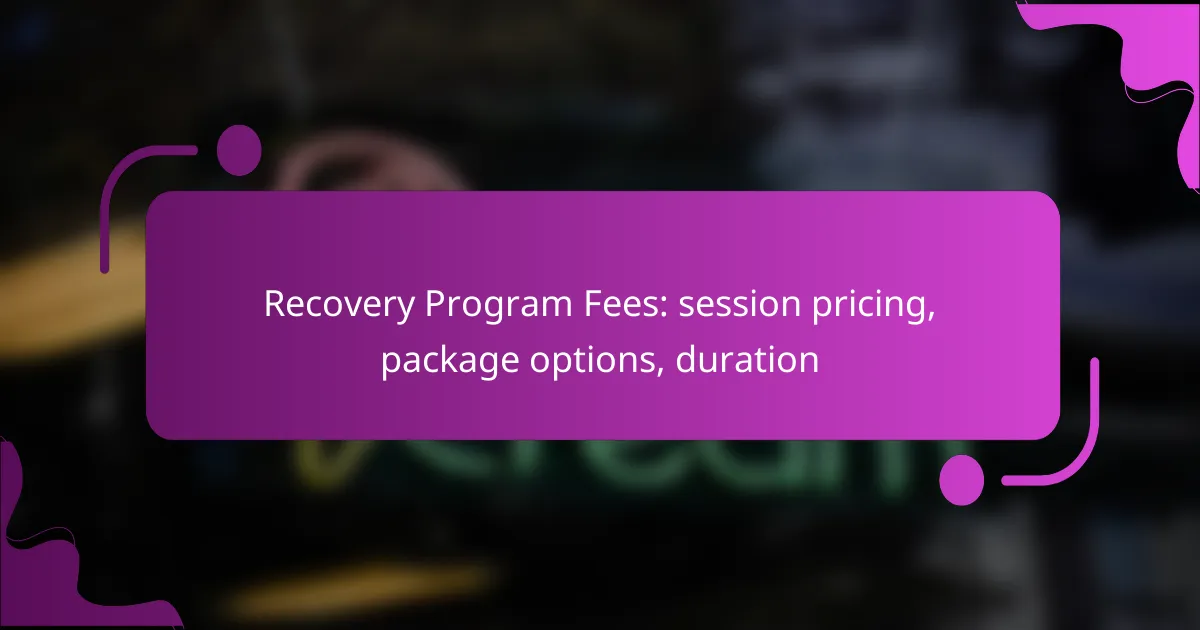The recovery program fees in Toronto are determined by session type, package options, and duration, allowing participants to choose what best fits their needs. Sessions generally last between 45 minutes to 1 hour, providing ample time for effective engagement. By understanding the pricing factors, individuals can make informed choices about their recovery journey.
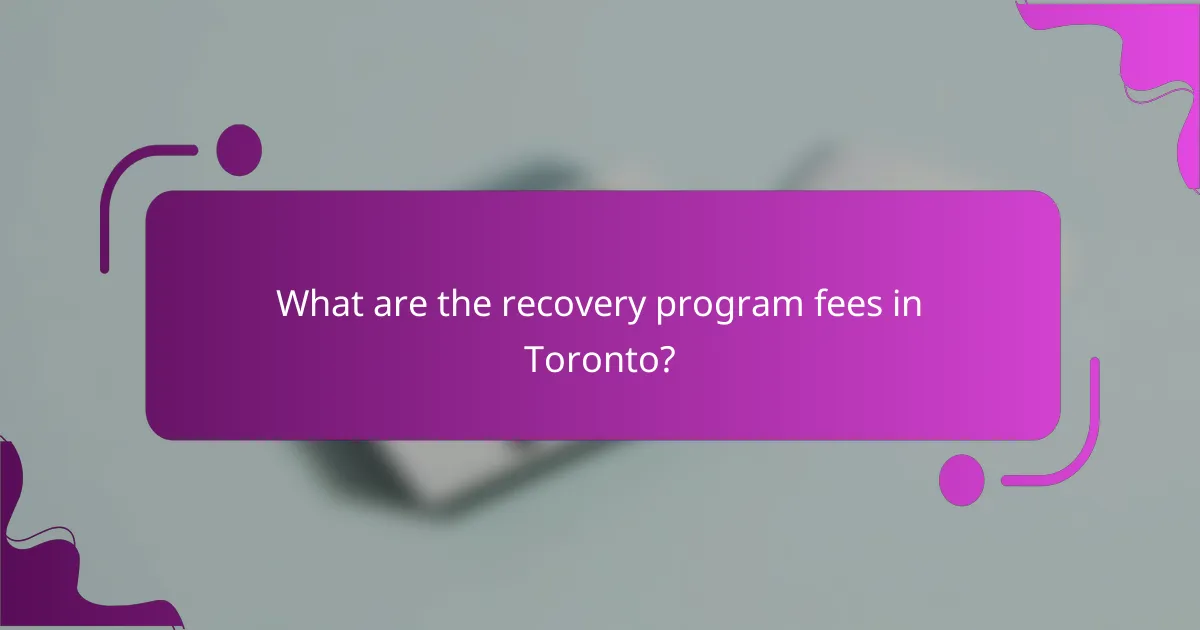
What are the recovery program fees in Toronto?
The recovery program fees in Toronto vary based on session type, package options, and duration. Understanding these costs can help you make informed decisions about your recovery journey.
Individual session pricing
Individual session pricing for recovery programs in Toronto typically ranges from CAD 100 to CAD 200 per session. The exact fee may depend on the type of service, the provider’s qualifications, and the session length.
For example, a standard therapy session might cost around CAD 150, while specialized services like group therapy or workshops could be priced differently. Always confirm the rate with your provider before booking.
Package options available
Many recovery programs offer package options that can reduce the overall cost per session. Common packages include bundles of five or ten sessions, which may provide a discount compared to purchasing sessions individually.
For instance, a package of ten sessions might be priced at CAD 1,300, offering a savings of CAD 200 compared to buying each session separately. Packages can be a great way to commit to your recovery while managing expenses.
Discounts for multiple sessions
Discounts for multiple sessions are often available in Toronto, encouraging clients to engage in ongoing recovery efforts. Providers may offer tiered pricing where the more sessions you book, the lower the cost per session.
For example, booking three sessions might yield a 10% discount, while committing to a larger package could result in savings of 15% or more. Always inquire about any available discounts when discussing your options with a provider.
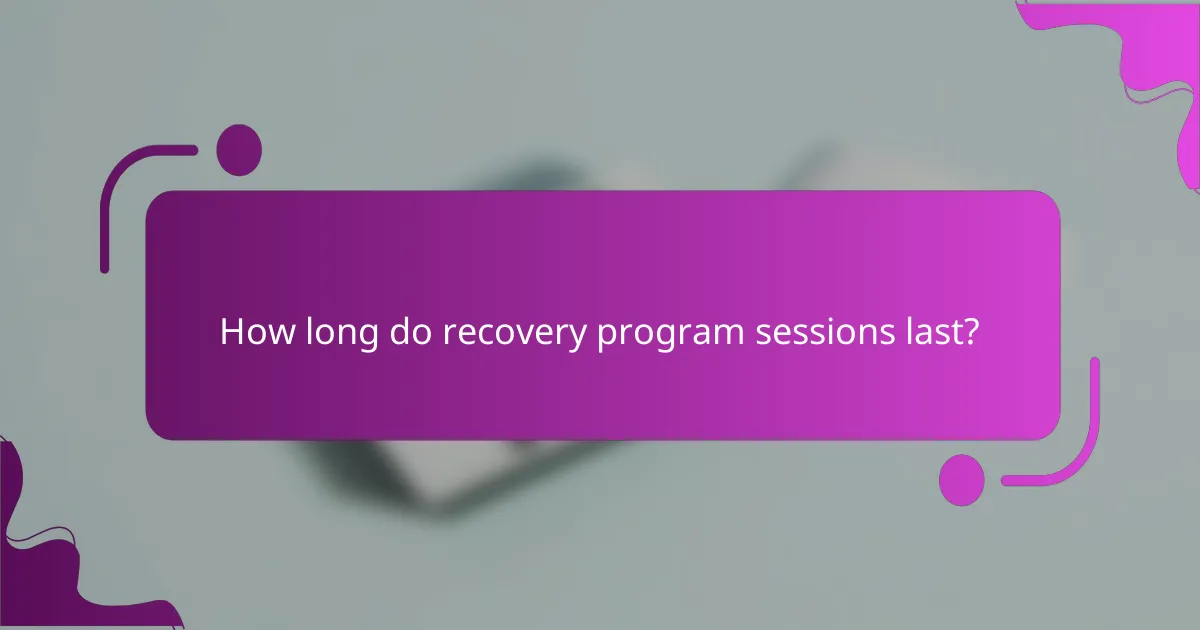
How long do recovery program sessions last?
Recovery program sessions typically last between 45 minutes to 1 hour, depending on the specific program and individual needs. Understanding the duration helps participants plan their schedules and maximize the benefits of each session.
Standard session duration
The standard duration for recovery program sessions is generally around 60 minutes. This timeframe allows for a comprehensive approach, including assessment, treatment, and feedback. Most programs are designed to fit within this hour to ensure participants receive adequate support without feeling rushed.
During these sessions, practitioners focus on various recovery techniques tailored to individual needs, which may include physical therapy, counseling, or group discussions. Consistency in session duration helps establish a routine that can enhance recovery outcomes.
Extended session options
For those requiring more intensive support, extended session options are available, typically lasting 90 minutes to 2 hours. These sessions can provide deeper engagement with recovery strategies and allow for more thorough exploration of personal challenges.
Extended sessions may be beneficial for individuals dealing with complex issues or those who prefer a more in-depth approach. However, it’s essential to consider personal stamina and focus, as longer sessions can be mentally and physically demanding.
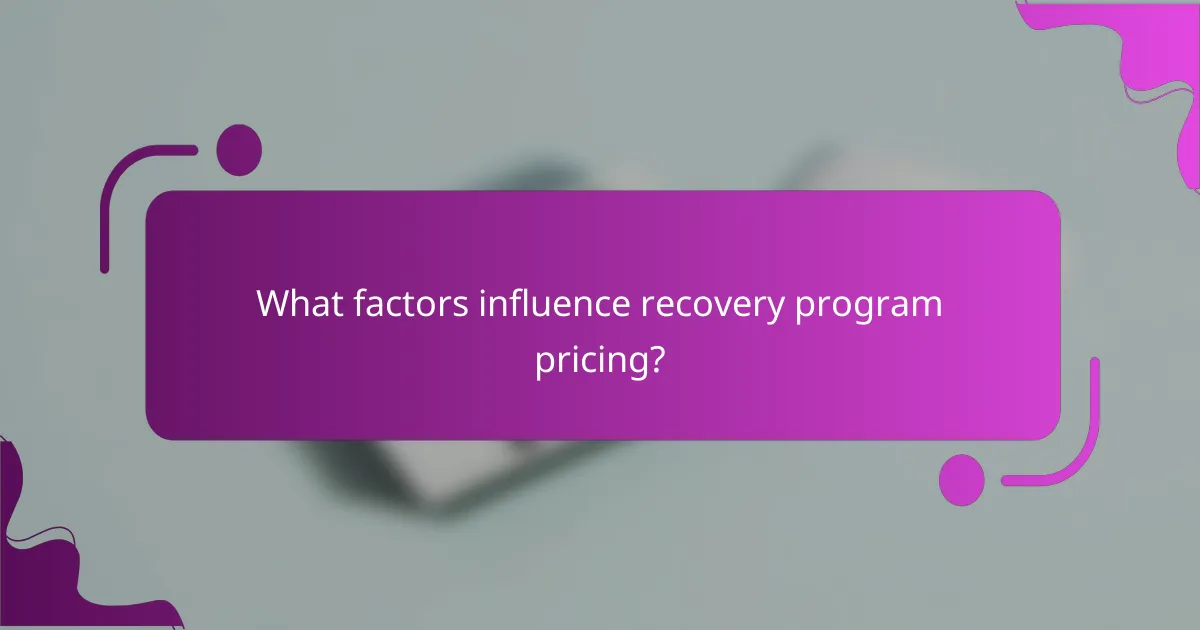
What factors influence recovery program pricing?
Recovery program pricing is influenced by several key factors, including location, the experience of practitioners, and the specific services offered. Understanding these elements can help individuals make informed decisions about their recovery options.
Location-based pricing variations
Pricing for recovery programs can vary significantly based on geographic location. Urban areas often have higher costs due to increased demand and overhead expenses, while rural locations may offer more affordable options. For example, a session in a major city like New York might range from $150 to $300, whereas a similar session in a smaller town could be between $75 and $150.
Additionally, local economic conditions and the availability of services can impact pricing. In regions with fewer recovery facilities, prices may be higher due to limited competition. It’s advisable to research local options and compare prices to find the best fit for your budget.
Experience of the practitioners
The experience level of practitioners also plays a crucial role in determining recovery program fees. Highly experienced professionals, such as licensed therapists or certified coaches, typically charge more for their services due to their expertise and proven track record. Rates for seasoned practitioners can range from $100 to $250 per session.
Conversely, newer practitioners may offer lower rates as they build their clientele. While cost is an important factor, consider the qualifications and specializations of the practitioners to ensure you receive quality care. Look for credentials and client reviews to gauge their effectiveness.
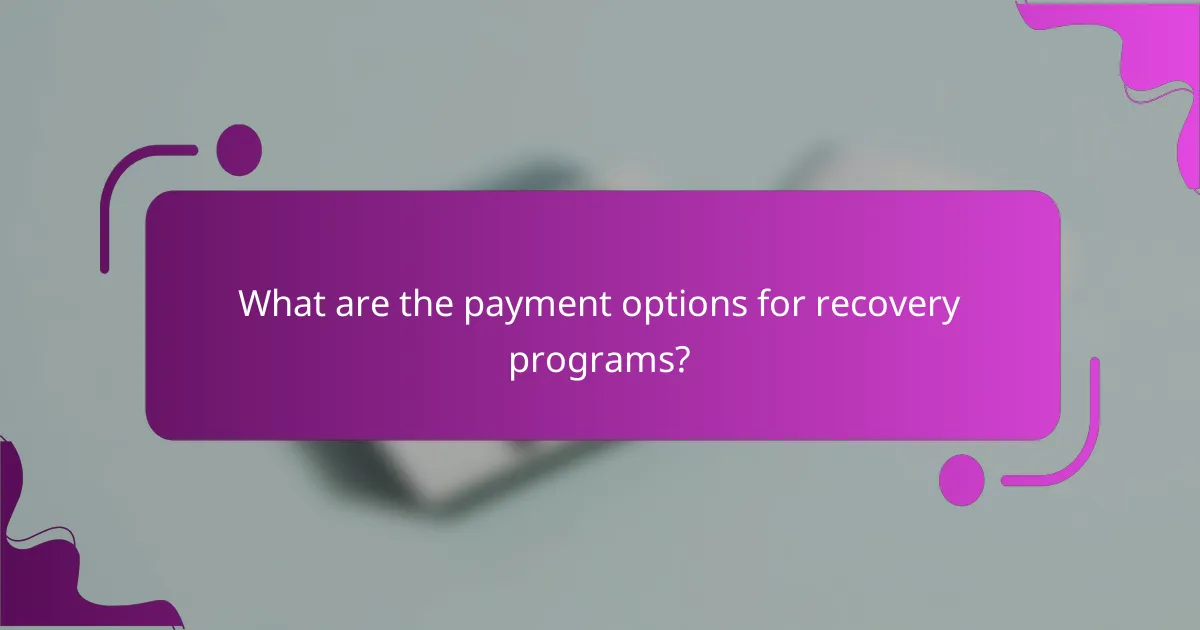
What are the payment options for recovery programs?
Recovery programs typically offer various payment options to accommodate different financial situations. These can include insurance coverage, payment plans, and upfront session pricing or package deals.
Insurance coverage details
Many recovery programs accept insurance, which can significantly reduce out-of-pocket expenses. Coverage often varies by provider and plan, so it’s essential to verify with your insurance company what services are included.
Commonly covered services may include individual therapy sessions, group therapy, and certain medications. Be sure to check for any co-pays or deductibles that may apply.
Payment plans available
Payment plans can help manage the costs of recovery programs by breaking down the total fee into smaller, more manageable payments. These plans often allow clients to pay over several months, making it easier to budget for treatment.
When considering a payment plan, inquire about interest rates and any additional fees that may apply. Some programs may offer interest-free options, while others might charge a fee for extended payment terms.
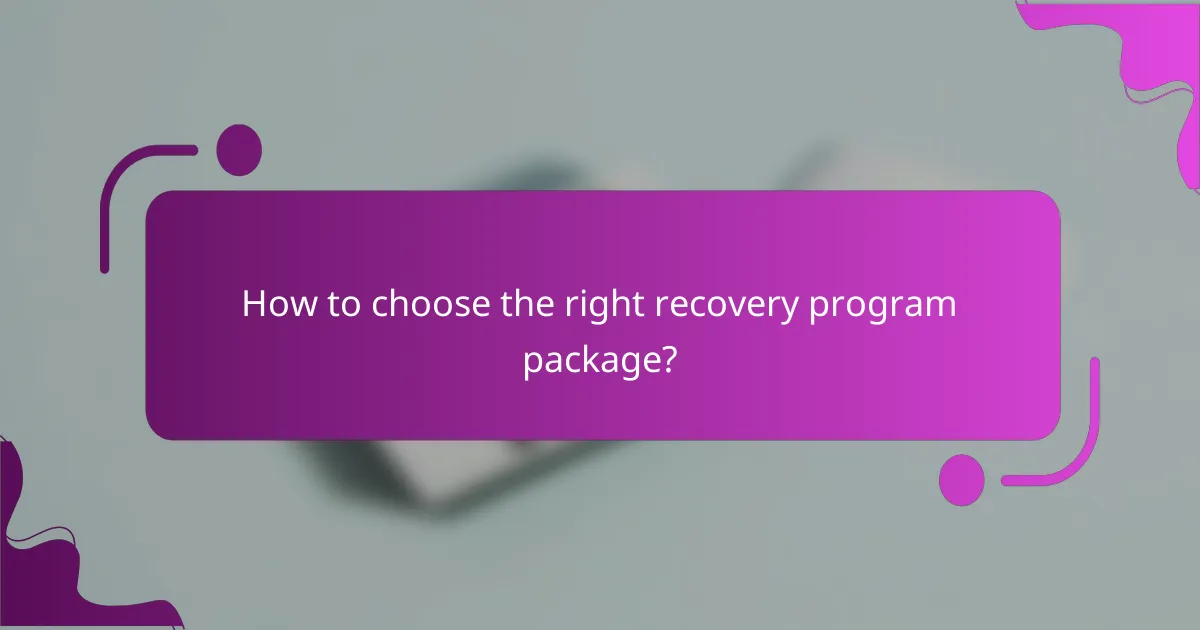
How to choose the right recovery program package?
Choosing the right recovery program package involves evaluating your specific needs and comparing options from local service providers. Consider factors such as session pricing, package options, and the duration of the programs to make an informed decision.
Assessing individual needs
Start by identifying your recovery goals and the level of support you require. Consider whether you need intensive therapy sessions or a more flexible approach that allows for gradual progress. This will help you determine the type of package that best suits your situation.
Additionally, think about your schedule and availability. Some programs offer shorter, more frequent sessions, while others may provide longer sessions less often. Assessing your personal circumstances will guide you in selecting a package that fits your lifestyle.
Comparing local service providers
Research various recovery program providers in your area to understand their offerings and pricing structures. Look for programs that provide transparent information about session costs, package deals, and any additional fees. This will help you gauge the overall value of each option.
When comparing providers, consider reading reviews or testimonials from previous clients. This feedback can provide insights into the effectiveness of the programs and the quality of support offered. Make a list of potential providers and weigh their pros and cons based on your individual needs and budget.
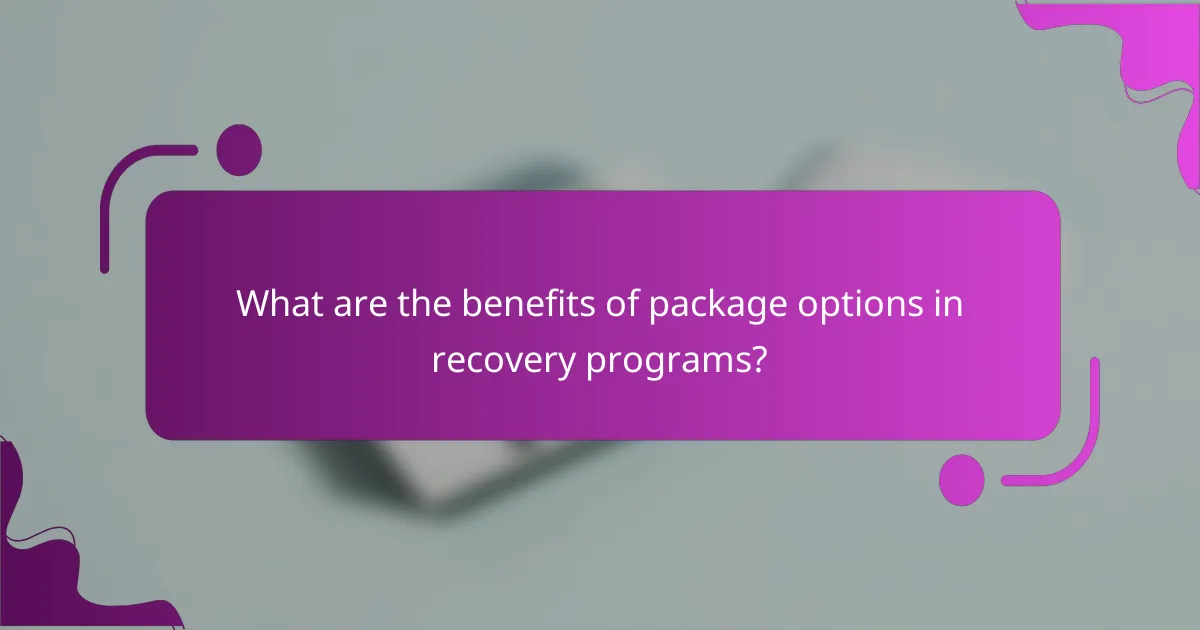
What are the benefits of package options in recovery programs?
Package options in recovery programs offer clients a structured approach to treatment, often resulting in both cost efficiency and enhanced support. By bundling services, participants can access a comprehensive range of therapies and resources tailored to their needs.
Cost savings with packages
Choosing package options can lead to significant cost savings compared to purchasing individual sessions. Many recovery programs offer discounts for bulk purchases, which can reduce the overall expense by a noticeable percentage, often in the range of 10-30% depending on the provider.
For example, a package of ten therapy sessions might cost less per session than buying each one separately. Clients should compare the total costs of packages versus single sessions to determine the best financial choice for their recovery journey.
Comprehensive care through bundled services
Package options often include a variety of services, such as counseling, group therapy, and wellness activities, providing a holistic approach to recovery. This comprehensive care ensures that clients receive well-rounded support, addressing multiple aspects of their recovery simultaneously.
Additionally, bundled services can facilitate continuity of care, as clients engage with the same team of professionals throughout their treatment. This familiarity can enhance trust and improve outcomes, making it easier for clients to stay committed to their recovery goals.
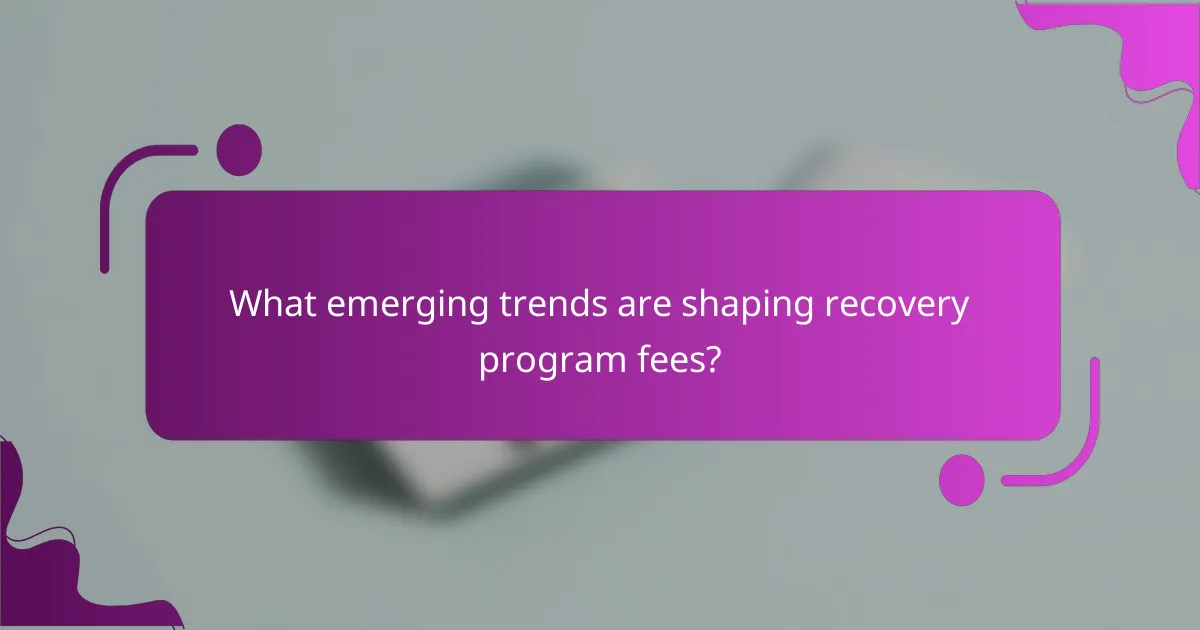
What emerging trends are shaping recovery program fees?
Recovery program fees are increasingly influenced by factors such as personalized care, technology integration, and flexible pricing structures. These trends reflect a shift towards accommodating individual needs and preferences while ensuring accessibility and effectiveness in recovery services.
Session Pricing
Session pricing for recovery programs can vary significantly based on location, type of service, and provider expertise. Typically, individual sessions may range from $50 to $200, depending on the complexity of the treatment and the qualifications of the practitioner. It’s essential to inquire about what each session includes to understand the value offered.
Some facilities may offer tiered pricing based on the duration of the session or the specific services provided. For example, a standard one-hour session might cost less than a specialized session that includes additional therapies or assessments.
Package Options
Many recovery programs provide package options that offer a discounted rate for purchasing multiple sessions upfront. These packages can range from five to twenty sessions, often leading to savings of 10% to 30% compared to single-session pricing. This approach encourages commitment and can enhance the overall effectiveness of the recovery process.
When considering package options, evaluate the flexibility of scheduling and the ability to customize sessions based on progress. Some programs allow clients to mix and match services within a package, which can be beneficial for addressing diverse recovery needs.
Duration
The duration of recovery sessions typically ranges from 30 minutes to two hours, depending on the type of therapy and individual requirements. Shorter sessions may be suitable for check-ins or specific interventions, while longer sessions can provide more comprehensive care and support.
It’s important to discuss with your provider the expected duration for your specific recovery needs. Some programs may offer extended sessions for intensive therapies, which can be particularly useful for those facing complex challenges in their recovery journey.
